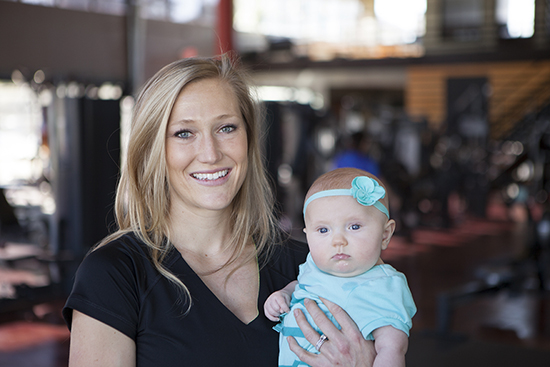You may not feel like exercising when you’re pregnant, but keeping active during pregnancy has numerous benefits for both you and your baby.
“Maintaining your fitness during pregnancy will help you get through the delivery,” says Highland Park Personal Trainer, Katie Corkill, who recently gave birth to her first child. “Labor is a very physical thing, no matter what route you take. Exercising throughout your pregnancy will help prepare your body for the physical intensity of labor and help you recover more quickly.”
Being physically fit can also benefit your baby. When a mother is physically active throughout her pregnancy, her baby is more likely to be at a healthy birth weight. Eating healthy during pregnancy carries those healthy nutrients over to the baby. Keeping up with a regular fitness routine during pregnancy will help you maintain a lower heart rate, better blood flow and better blood pressure — all of these factors create a healthier environment for your baby.
Common questions about working out during pregnancy
Throughout her pregnancy with her daughter, staying in shape was important for Corkill’s physical and mental wellbeing. Corkill provides answers to common questions about exercising during pregnancy.
How much should I workout during my pregnancy?
Listen to your body.The amount of exercise you get during pregnancy partly depends on your pre-pregnancy fitness level. If you exercise regularly prior to getting pregnant, you should be able to maintain that level of fitness throughout the majority of your pregnancy. Consider giving yourself an extra day of rest depending on how you feel and how your pregnancy is going Remember that something is always better than nothing, even if you aren’t able to do your typical workout.
Which types of exercise are most important for pregnant women?
Both strength and cardio workouts are important for maximum fitness when you’re not pregnant. The same is true during pregnancy, although as you progress through your pregnancy, you may need to slowly decrease the intensity of your workouts. A personal trainer can help you develop the right mix of strength and cardio to suit your individual needs.
What are some examples of exercises that are safe for pregnant women?
Exercising indoors is generally safer for pregnant women. When you exercise outside, there is a greater risk of tripping. Keep yourself in a safe environment where there are as few hazards as possible. Get your cardio in on a treadmill, elliptical or upright bike. Resistance training is also a safe exercise for pregnant women. Stick to single-joint movements and avoid too many abdominal exercises or overhead exercises during pregnancy.
Corkill worked out regularly throughout the duration of her pregnancy. She was even in the gym the day before she was induced (two weeks after her due date!). As a result, she was able to maintain her mobility during pregnancy, felt good about her body, and recovered quickly after pregnancy.
Note: Please discuss your pregnancy exercise plans with your doctor and follow his or her instructions for working out during your pregnancy.


